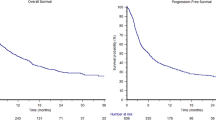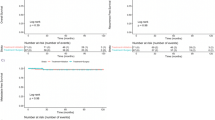Abstract
Purpose
There is little information on tolerability to cisplatin-based chemotherapies in patients with a solitary kidney after nephroureterectomy. We evaluated the impact of having a solitary kidney on tolerability to gemcitabine plus cisplatin (GC) chemotherapy in urothelial carcinoma patients.
Methods
We retrospectively reviewed medical records of patients treated between August 2007 and November 2015. Eligible patients had received GC as first-line chemotherapy, including as neoadjuvant and adjuvant treatment. Patients who commenced GC chemotherapy after nephroureterectomy comprised the solitary kidney (SK) group; the remaining patients (i.e., those with both kidneys) comprised the BK group. Incidences of hematologic toxicities and renal insufficiency were examined and compared between two groups.
Results
There were 16 patients in the SK group and 31 in the BK group. The incidence of hematologic toxicity (grade 3/4) was not significantly different between the two groups (neutropenia: 68.8 vs. 74.2%, respectively (P = 0.959); thrombocytopenia: 31.2 vs. 51.6%, respectively (P = 0.307); and anemia: 12.5 vs. 38.7%, respectively (P = 0.094)). Multivariate analysis revealed no statistically significant association between having a SK and severe hematologic toxicities. Moreover, no significant differences were observed in the incidence of acute kidney injury. The mean differences in serum creatinine and estimated glomerular filtration rate between baseline and each post-chemotherapy cycle were similar when comparing the SK and BK groups.
Conclusions
There is no evidence that tolerability to GC chemotherapy is inferior in patients with a solitary kidney. Therefore, there may be no need to avoid administering CDDP-based chemotherapy to such patients.
Similar content being viewed by others
References
Lynch CF, Cohen MB (1995) Urinary system. Cancer 75:316–329
National Comprehensive Cancer Network (2016) NCCN clinical practice guidelines in oncology. Bladder cancer, Version 2. http://www.nccn.org/professionals/physician_gls/pdf/bladder.pdf. Accessed 23 Sept 2016
Chalasani V, Chin JL, Izawa JI (2009) Histologic variants of urothelial bladder cancer and nonurothelial histology in bladder cancer. Can Urol Assoc J 3:S193–S198
Hall MC, Womack S, Sagalowsky AI, Carmody T, Erickstad MD, Roehrborn CG (1998) Prognostic factors, recurrence, and survival in transitional cell carcinoma of the upper urinary tract: a 30-year experience in 252 patients. Urology 52:594–601
von der Maase H, Hansen SW, Roberts JT, Dogliotti L, Oliver T, Moore MJ, Bodrogi I, Albers P, Knuth A, Lippert CM, Kerbrat P, Sanchez Rovira P, Wersall P, Cleall SP, Roychowdhury DF, Tomlin I, Visseren-Grul CM, Conte PF (2000) Gemcitabine and cisplatin versus methotrexate, vinblastine, doxorubicin, and cisplatin in advanced or metastatic bladder cancer: results of a large, randomized, multinational, multicenter, phase III study. J Clin Oncol 18:3068–3077
Moore MJ, Winquist EW, Murray N, Tannock IF, Huan S, Bennett K, Walsh W, Seymour L (1999) Gemcitabine plus cisplatin, an active regimen in advanced urothelial cancer: a phase II trial of the national cancer institute of Canada clinical trials group. J Clin Oncol 17:2876–2881
Loehrer PJ, Einhorn LH (1984) Drugs 5 years later Cisplatin. Ann Intern Med 100:704–713
Go RS, Adjei AA (1999) Review of the comparative pharmacology and clinical activity of cisplatin and carboplatin. J Clin Oncol 17:409–422
Dogliotti L, Cartenì G, Siena S, Bertetto O, Martoni A, Bono A, Amadori D, Onat H, Marini L (2007) Gemcitabine plus cisplatin versus gemcitabine plus carboplatin as first-line chemotherapy in advanced transitional cell carcinoma of the urothelium: results of a randomized phase 2 trial. Eur Urol 52:134–141. doi:10.1016/j.eururo.2006.12.029
Galsky MD, Hahn NM, Rosenberg J, Sonpavde G, Hutson T, Oh WK, Dreicer R, Vogelzang N, Sternberg CN, Bajorin DF, Bellmunt J (2011) Treatment of patients with metastatic urothelial cancer “unfit” for cisplatin-based chemotherapy. J Clin Oncol 29:2432–2438. doi:10.1200/JCO.2011.34.8433
Kidney Disease: Improving Global Outcomes (KDIGO) Acute Kidney Injury Work Group (2012) KDIGO clinical practice guideline for acute kidney injury. Kidney Int Suppl 2:1–138
Lyman GH, Kuderer NM, Crawford J, Wolff DA, Culakova E, Poniewierski MS, Dale DC (2011) Predicting individual risk of neutropenic complications in patients receiving cancer chemotherapy. Cancer 117:1917–1927. doi:10.1002/cncr.25691
Schwartz RN (2007) Anemia in patients with cancer: incidence, causes, impact, management, and use of treatment guidelines and protocols. Am J Health Syst Pharm 64:S5–S13. doi:10.2146/ajhp060601
Kanda Y (2013) Investigation of the freely available easy-to-use software ‘EZR’ for medical statistics. Bone Marrow Transplant 48:452–458. doi:10.1038/bmt.2012.244
Huang WC, Levey AS, Serio AM, Snyder M, Vickers AJ, Raj GV, Scardino PT, Russo P (2006) Chronic kidney disease after nephrectomy in patients with renal cortical tumours: a retrospective cohort study. Lancet Oncol 7:735–740. doi:10.1016/S1470-2045(06)70803-8
Hellenthal NJ, Shariat SF, Margulis Karakiewicz PI, Roscigno M, Bolenz C, Remzi M, Weizer A, Zigeuner R, Bensalah K, Ng CK, Raman JD, Kikuchi E, Montorsi F, Oya M, Wood CG, Fernandez M, Evans CP, Koppie TM (2009) Adjuvant chemotherapy for high risk upper tract urothelial carcinoma: results from the upper tract urothelial carcinoma collaboration. J Urol 182:900–906. doi:10.1016/j.juro.2009.05.011
Funding
This study did not rely on any external sources of funding.
Author information
Authors and Affiliations
Corresponding author
Ethics declarations
Conflict of interest
The authors declare that they have no conflict of interest.
Ethical approval
All procedures performed in studies involving human participants were in accordance with the ethical standards of the institutional and/or national research committee and with the 1964 Helsinki declaration and its later amendments or comparable ethical standards. For this type of study formal consent is not required.
Rights and permissions
About this article
Cite this article
Kondo, M., Hotta, Y., Ando, R. et al. The impact of a solitary kidney on tolerability to gemcitabine plus cisplatin chemotherapy in urothelial carcinoma patients: a retrospective study. Cancer Chemother Pharmacol 79, 995–1001 (2017). https://doi.org/10.1007/s00280-017-3277-x
Received:
Accepted:
Published:
Issue Date:
DOI: https://doi.org/10.1007/s00280-017-3277-x




